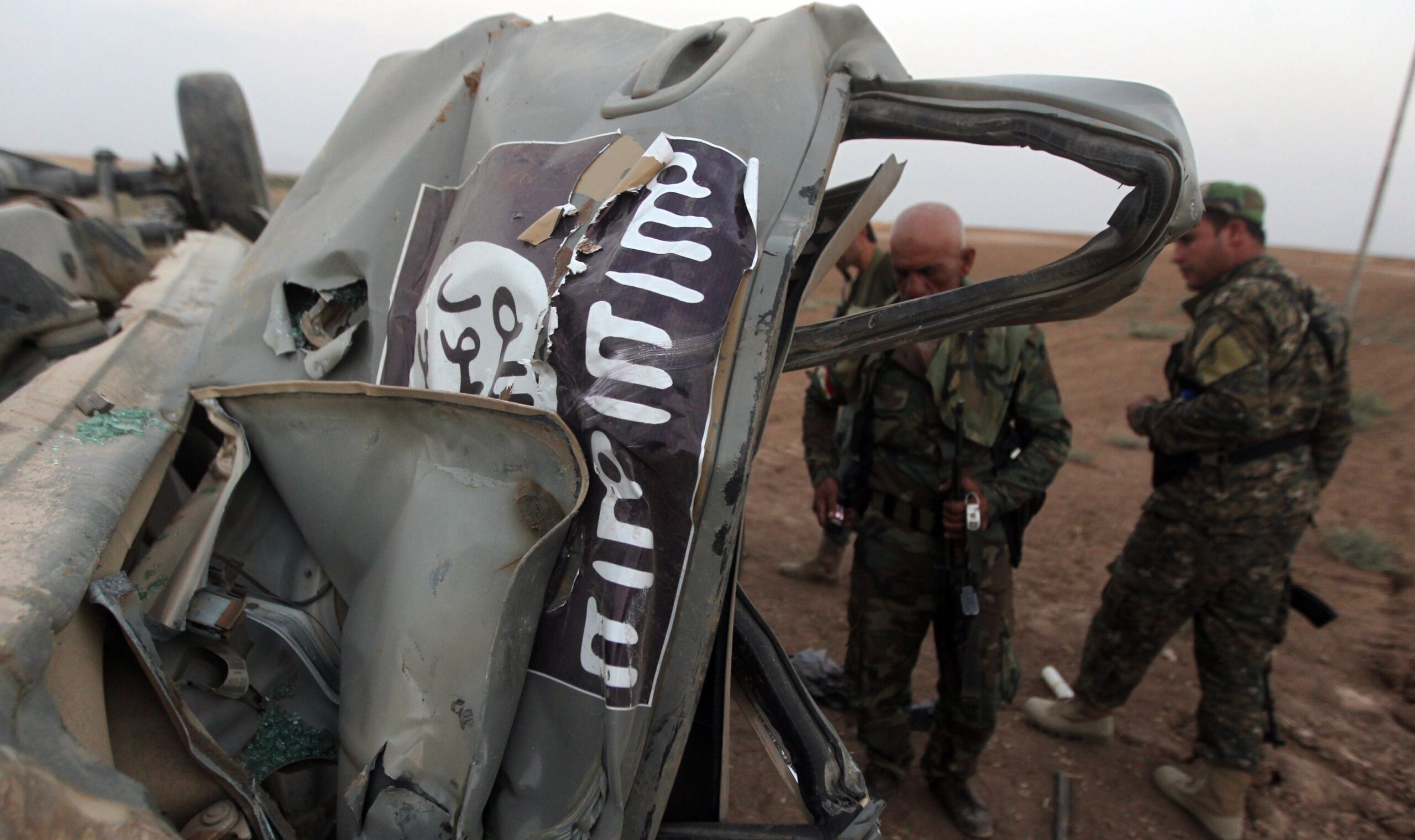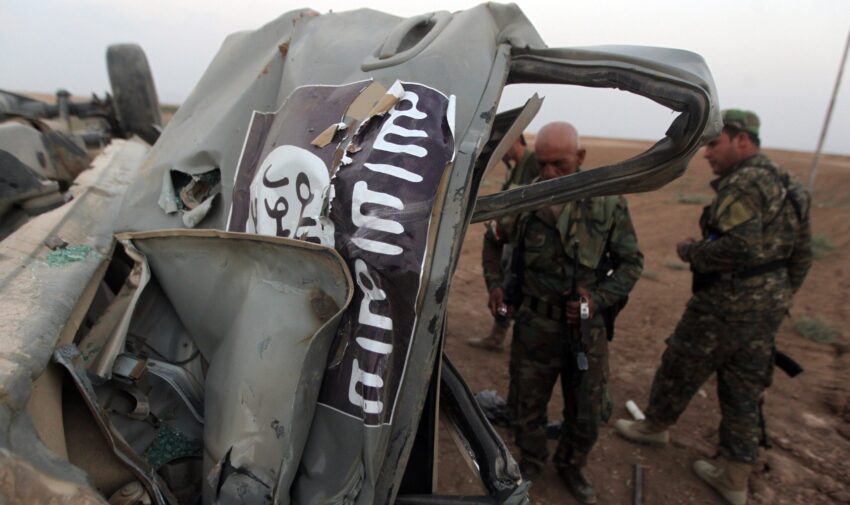Regime Change in Iran Would Endanger America
Toppling Tehran would empower terror groups.

The recent 12-day war between Iran and Israel—which ended after the United States bombed three Iranian nuclear sites—sparked hopes and fears of regime change in the Islamic Republic. Israeli and American leaders indicated that regime change in Iran was on the table, prompting enthusiastic support from hawks but also a flurry of warnings from anti-interventionists.
Many of the warnings focused on how regime change could result in a hard-line military leadership under the Iranian revolutionary guards. Some analysts warned that ousting Tehran’s leadership could embolden separatists within Iran, with grave regional repercussions.
Less attention was paid to how toppling the Iranian state would work to the advantage of terrorist groups that have declared their intent to attack the U.S. homeland and interests. The relative lack of attention is odd, considering how large the disastrous U.S. war in Iraq still looms in political discourse. After all, one reason that war turned into a calamity is that the ouster of the dictator Saddam Hussein enabled Al Qaeda to establish a foothold in the country.
Given that Israeli and American advocates of regime change in Iran will not abandon their pursuit of this goal—notwithstanding the ceasefire that ended the 12-day war—it would be useful to anticipate and reflect on the possibility of terrorists filling the void that regime change would produce.
One of the most active and lethal terrorist groups operating today is Islamic State—Khorasan Province. Otherwise known as ISIS-K, this organization rose to prominence after the Abbey Gate bombing at the Kabul airport in 2021. A suicide bomber affiliated with the group carried out the attack, which resulted in the death of around 169 Afghan civilians and 13 American soldiers.
The threat posed by ISIS-K has grown more acute in recent years. The group was responsible for the 2024 attacks in the Iranian city of Kerman, which killed over 90 people. Months later, ISIS-K claimed responsibility for the Crocus City Hall massacre in Moscow that left more than 140 people dead. Both operations are among the deadliest spectacular mass-casualty terrorist acts in recent history.
U.S. officials have sounded the alarm over the threat posed by ISIS-K. In a Congressional testimony in March 2023, Centcom commander Gen. Michael Kurilla warned that ISIS-K “retains the capability and the will to attack U.S. and Western interests abroad in as little as six months with little to no warning.”
While the event Kurilla warned about hasn’t yet materialized, toppling the Iranian leadership would likely strengthen the group and bring it closer to achieving such goals. Former Centcom commander Joseph Votel recently cautioned that Washington’s policy towards Iran must take into account the likelihood that Salafi-jihadi groups like ISIS and Al Qaeda stand to benefit from a weakened state in the Islamic Republic. “The state still controls the population, but the degradation of control will provide them [ISIS and Al Qaeda] with operating space in the long term, either to co-opt the population or to further utilize the area as a sanctuary for their planning and operations,” Votel said in an interview with Newsweek.
Gaining a foothold in Iran would also serve ISIS-K’s agenda of establishing a caliphate in the historical Khorasan region from which it derives its name. This region includes parts of Iran, Pakistan, and Afghanistan, along with several Central Asian countries. ISIS-K already maintains an active presence in the Afghanistan-Pakistan border region, and the lawlessness that would prevail in the event of regime change in Iran would provide a strong boost to its transnational aspirations. This could be one reason why Islamabad came out so strongly against Israel’s recent military operations targeting Iran.
An ISIS-K presence in Iran would help the ISIS parent organization reestablish itself in neighboring Iraq. Moreover, ISIS appears to be returning with a vengeance in Syria, with whom Iraq also shares a border. A recent terrorist attack targeting a church in the capital Damascus led to the death of over 20 people. While a group calling itself “Saraya Ansar al-Sunna” took credit for the operation, Syrian authorities declared ISIS responsible.
Thus, if the Iranian regime collapses, an ISIS crescent stretching from Iran through Iraq to Syria isn’t out of the question. In that case, Iran would serve as a potential lynchpin connecting the ISIS South Asia branch (ISIS-K) with the parent organization in the Levant, a scenario which even ISIS itself likely never dreamt of. The surge in terrorism in post-Saddam Iraq would pale in comparison.
These potential realities strongly contradict the notion that a regime change scenario in Iran would spell the demise of “Islamism,” a term that elides meaningful differences between Islamic organizations, including between the Islamic Republic of Iran and Sunni terror groups. This argument has featured recently in expert commentary, with some analysts going so far as to suggest that there exists common cause between Tehran and ISIS. Such claims are dubious, at best, and ignore basic realities.
Chief among them is that ISIS sees Iran and Shiites more broadly as public enemy number one, which is reflected in the fact that ISIS has conducted deadly attacks in Iran on more than one occasion. Indeed, the Salafi-jihadi terrorist organization is a top national security threat for Iran. Another ignored fact is that groups like ISIS, as mentioned above, thrive on the chaos and power vacuum that often come with regime change, with Libya being a primary example.
Fortunately, President Donald Trump, after indicating an openness to regime change in Iran, appears to have abandoned the idea (at least for now), warning of the chaos that could occur as a result. From the standpoint of American national security interests, this is the right call.
ISIS has publicly declared its intent to attack the U.S. homeland, and it adheres to the same Salafi-jihadi ideology as Al Qaeda, the group behind 9/11. ISIS already has a history of inspiring attacks in the United States, including the terrorist attack in New Orleans earlier this year. Taking advantage of the turmoil in the event of regime change in Iran would better position ISIS to follow through on its threat to the United States, giving it a wider base from which to plan and prepare external operations. The president, to avoid such unintended consequences, should rebuff the hawks and say no to regime change in Iran.
The post Regime Change in Iran Would Endanger America appeared first on The American Conservative.
Click this link for the original source of this article.
Author: Ali Rizk
This content is courtesy of, and owned and copyrighted by, http://www.theamericanconservative.com and its author. This content is made available by use of the public RSS feed offered by the host site and is used for educational purposes only. If you are the author or represent the host site and would like this content removed now and in the future, please contact USSANews.com using the email address in the Contact page found in the website menu.








